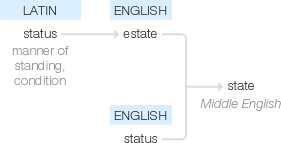State
Middle English (as a noun): partly a shortening of estate, partly from Latin status ‘manner of standing, condition’ (see status). The current verb senses date from the mid 17th century.
wiktionary
Middle English (as a noun); adopted c. 1200 from both Old French estat and Latin status(“manner of standing, attitude, position, carriage, manner, dress, apparel; and other senses”), from stare(“to stand”). Doublet of estate and status. The sense of "polity" develops in the 14th century. Compare French être, Greek στέω(stéo), Italian stare, Portuguese estar, Romanian sta, and Spanish estar.
etymonline
state (n.1)
c. 1200, "circumstances, position in society, temporary attributes of a person or thing, conditions," from Old French estat "position, condition; status, stature, station," and directly from Latin status "a station, position, place; way of standing, posture; order, arrangement, condition," figuratively "standing, rank; public order, community organization," noun of action from past participle stem of stare "to stand" from PIE root *sta- "to stand, make or be firm." Some Middle English senses are via Old French estat (French état; see estate).
The Latin word was adopted into other modern Germanic languages (German, Dutch staat) but chiefly in the political senses only. Meaning "physical condition as regards form or structure" is attested from late 13c. Meaning "mental or emotional condition" is attested from 1530s (phrase state of mind first attested 1749); colloquial sense of "agitated or perturbed state" is from 1837.
He [the President] shall from time to time give to the Congress Information of the State of the Union, and recommend to their Consideration such Measures as he shall judge necessary and expedient. [U.S. Constitution, Article II, Section iii]
state (v.)
1590s, "to set in a position," from state (n.1); the sense of "declare in words" is first attested 1640s, from the notion of "placing" something on the record. Related: Stated; stating.
state (n.2)
"political organization of a country, supreme civil power, government," c. 1300, from special use of state (n.1); this sense grew out of the meaning "condition of a country" with regard to government, prosperity, etc. (late 13c.), from Latin phrases such as status rei publicæ "condition (or existence) of the republic."
The sense of "a semi-independent political entity under a federal authority, one of the bodies politic which together make up a federal republic" is from 1774. The British North American colonies occasionally were called states as far back as 1630s; the States has been short for "the United States of America" since 1777; also of the Netherlands. State rights in U.S. political sense is attested from 1798; form states rights is first recorded 1858. Church and state have been contrasted from 1580s. State-socialism attested from 1850.
